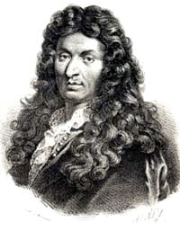 |
| Jean-Baptiste Lully http://www.classissima.com/en/people/Jean-Baptiste_Lully/ |
"Oh! I've seen that name before. I just didn't know it was pronounced 'loo-LEE'." I was telling a friend about a course I'm teaching. It focuses on Jean-Baptiste Lully's musical innovations (mainly in opera and ballet) in the court of Louis XIV (1638-1715). I loved preparing this behemoth course, but as it is multidisciplinary, it took a lot of time and a lot of reading. I spent much class time introducing the court of the "Sun King," its major players and Louis XIV's lifelong desire to make France the epitome of culture and intelligence of the early Baroque. Only with an understanding of that milieu would Lully's court entertainment make sense.
 |
Louis
XIV, King of France, in Royal Costume
Hyacinthe
Rigaud,
1701
Musee
de Louvre
ARTSTOR
1039490421
|
Louis XIV's father, Louis XIII, died when XIV was only five years old. His mom, Queen Anne (of Austria) took over as regent until XIV was old enough, or as they say, attained his majority. Queen Anne selected Cardinal Mazarin as her assistant. Depending on who you listen to, Mazarin might be an evil, power-hungry genius, or he may be a nice, smart guy who administered France until XIV was ready to take over. In any event, Louis was crowned in 1661, and he set about modernizing Paris and creating an opulent lifestyle that he hoped would be emulated by all other European countries. Part of that lifestyle was top-notch entertainment, and here is where Jean-Philippe Lully (1632-1687) enters the story.
Lully came to Paris from Italy and worked as a page and choirboy at the palace. He was trained on the violin as most musicians were then, and eventually began composing music for ballets. There were two kinds of ballets then, Ballet de cour which were spectacles, and La belle danse ("The Dance of Kings") which evolved into classical ballets as we know them. Louis XIV danced often in these productions, at least when he was young, and he was very proud of his dancer's legs. That is why his legs are often shown in portraits (with different colored tights). He got his nickname "The Sun King" from his affinity for portraying the sun itself in these performances. Here's a clip from the movie Le Roi Danse with Louis XIV as the sun, and music by Lully. The ballet is Ballet de la Nuit, a ballet de cour.
Eventually, Lully enjoyed a collaboration with actor/playwright Molière (real name Jean-Baptiste Poquelin) and they created a new form of ballet called comédie-ballet which combined music, dance, and theater. This collaboration only lasted from 1664 to 1671, but it happened at a very important time in Louis XIV's career. He had just moved to the new palace at Versailles (did you know it had been a hunting lodge before it was transformed into an opulent palace?), and Louis XIV ordered lavish entertainment for his housewarming. Lully and Molière came up with Les Plaisirs de l’Île Enchantée, a six-day celebration where the king and 600 of his closest friends visited various spots on the Versailles property for installments of Ludovico Ariosto's epic poem "Orlando Furioso." On the second night, the king, as the character Roger, introduced the Lully-Molière comédie-ballet La Princesse d'Elide. Here is some lovely music from that production:
J-P Lully enjoyed a fantastic career in Louis XIV's court, making lasting innovations in music and ballet, but he is probably best-remembered for his unique tragic death. Back in Baroque France, conductors conducted with a tall staff instead of a little baton. Lully was jubilantly conducting his Te Deum, a sacred work in honor of the king's recovery from an illness. He accidentally stabbed his own foot with the staff, developed gangrene and died a few weeks later. "Ne me coupez pas!" Ironically, Louis XIV would also die of a gangrenous infection in his dancer's leg 28 years later.
During those 28 years after Lully's death and before XIV's, the court continued to enjoy Lully's compositions and newer composers would continue to compose in Lully's style because that is what the king liked. His reputation spread throughout the French provinces and beyond to other European cities. So have you heard of him: loo-LEE?
No comments:
Post a Comment